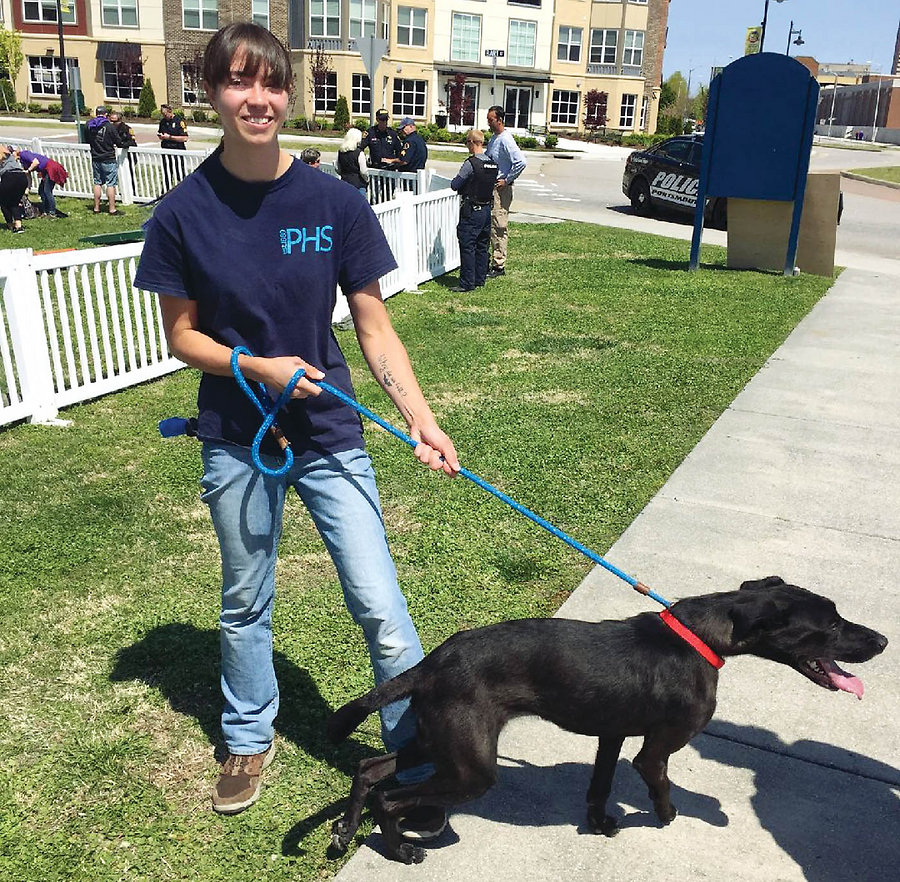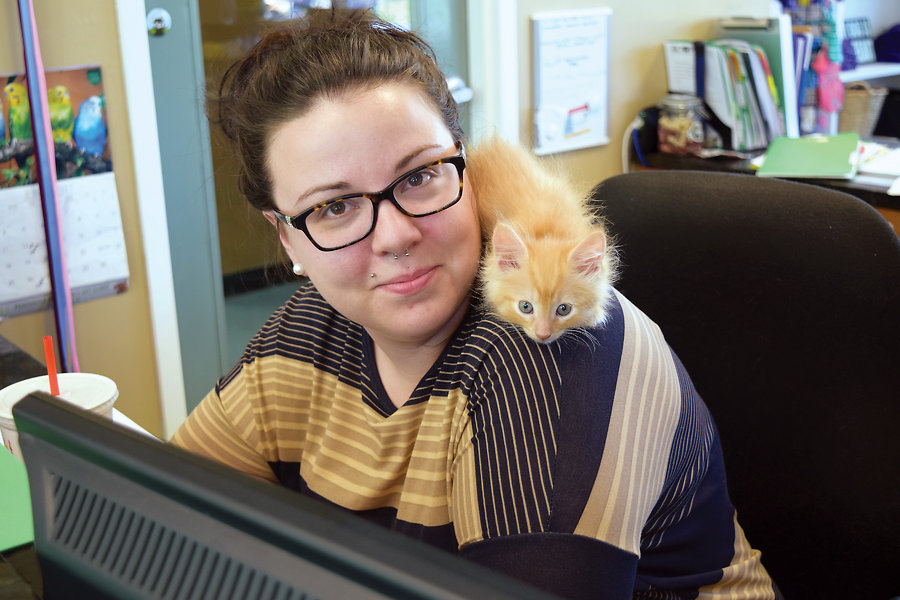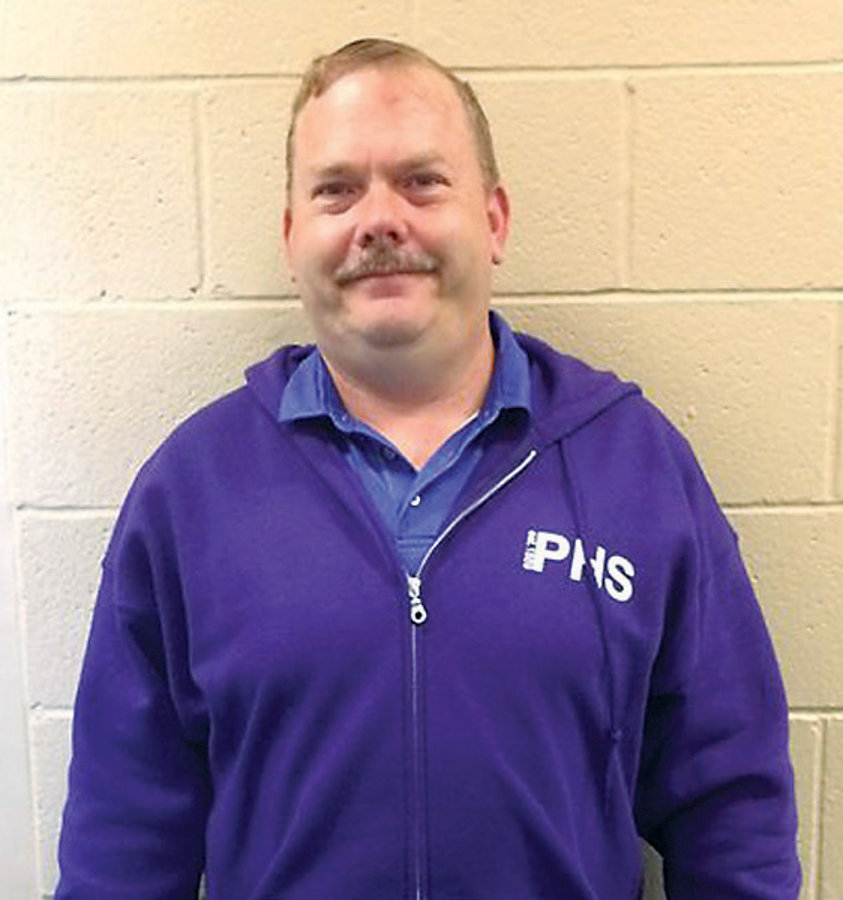 PORTSMOUTH HUMANE SOCIETY Offering love to those with room in their hearts and homes by Breonna Loxley "A lot of people
think shelter animals are not as good as pet store animals or
purebred animals," Michele McLaughlin, Animal Care Manager of
Portsmouth Humane Society says. After seven years in the field, she's
confident that they're just as good- and would even say they're
better. Zach Flota, also an Animal Care Manager, notes that many people don't realize the difference between an open intake and a closed intake shelter. A closed intake or "no kill" shelter is a facility which does not euthanize healthy or treatable animals. Closed intake shelters have the benefit of being able to only accept the animals they have the space, staff, and resources to care for. They are able to reserve euthanasia for terminally ill animals or those with severe behavioral problems. An open intake shelter, sometimes referred to as a "kill" shelter, must accommodate every stray or owner surrender, regardless of how full the shelter may be. Because open intake shelters offer refuge to every animal in need, they must sometimes euthanize healthy animals to make room. The idea that supporting these facilities means supporting euthanization is a common misconception. Blame is misdirected when it is assigned to the shelters, rather than those who neglect, abandon, or fail to sterilize their pets. The resulting unwanted animals populate the overcrowded, underfunded, understaffed shelters, and more than half of them never leave. "When a shelter's numbers [save rate] are lower than 90 percent, I think a lot of people tend to be less likely to adopt from them, and that's not helpful," Zach says. "One way that you can help a shelter reach percent is by supporting them. It really does take the whole community to do it."  "When I look into the eye of an animal, I see a living being. I see a friend. I feel a soul." - Douglas Williams "There are many people who hear animal shelter or Animal Control," Director of Operations James McLaughlin, points out, "and they believe the stereotype that we euthanize everything. For most shelters (especially in bigger cities) across the region, Animal Control and the City/County intake shelters and Private Shelters (VB SPCA, Norfolk SPCA, etc.) work diligently to save every animal that they can." "There are some people who don't see animals as family members and a ifelong commitment, or their animal gets lost and they don't look very hard to find them," James continues. "The national average for animals to be reclaimed from city/county intake shelters is only about 10 percent. These make up most of the animals we receive. The second biggest group is from owner surrenders. The reasons for surrender that we are given range from 'We are moving' to 'We're allergic', to active/destructive and can't afford/medical costs. Most shelters like ours do their best to offer low cost resources to help people keep their pets." The ASPCA estimates that approximately 1.5 million shelter animals are euthanized each year. Spreading awareness of the problem is an important step towards its eradication. A robust system of dedicated fosters and volunteers, a rigorous spay and neuter program, and events to help educate the public are all ways a shelter can minimize the footprint of euthanasia in its community. Involvement with such methods is one way to recognize a good shelter. If you want to learn more about the shelters in your area, volunteering is a rewarding way to become involved. Approximately 2,000 companion animals come into the Portsmouth Humane Society each year. In 2017, Portsmouth Humane Society's save rate was 86 percent. "We are extremely proud of this," James says, "because being an open admission shelter is not easy. Currently for 2018, we are sitting at 91 percent. Our goal is to finish this year over 90 percent- considered 'No Kill' according to the Asilomar Accords."  Breonna Loxley with a furry friend at The Portsmouth Humane Society’s 10th annual Cause for Paws "I
wish people knew that a shelter should be the last resort for their
pet," Zach says. "Obviously we are here to take care of them and
find them good homes, but it's not necessarily the most pleasant
place for an animal to be. There are a lot of good ways that you can
get them re-homed before taking them to a shelter." Shelters are
often full of compassionate people who go above and beyond to save as
many animals as possible, and to give them the best care. Despite
this, as Zach put it, "We could have the cleanest shelter with the
nicest kennels that money could buy, and still it's not going to be
a place that animals want to be. But, we can do a lot to make it a
better place to be. The biggest thing is decreasing their length of
stay so that it's just temporary." When people do choose to surrender their pet, it's important to be honest with shelter staff. "A lot of times, people feel so guilty about needing to surrender their animal, that they'll tell us it's a stray," Zach explains. "It's a missed opportunity to talk to people. It's a missed opportunity to find out the history of the animal. And then we've got to hold the animal for 10 days before it can be adopted, and a lot of times it's an animal that we could have made available, and they may have gone home right away. It's unnecessary for them to be in the shelter that long. There's a breakdown of communication in that department." "I'm not sure if people understand what all they're asking when they ask animal control to come pick up a cat," Zach says when asked for insight on feral cats. "I don't know if people realize that it's not going to come around and be friendly towards people and it's not going to be adopted into a regular home. If people knew that, they may be more inclined to find other ways of dealing with cats on their property if it's something that bothers them. There are deterrents that you can put in your yard. The solution doesn't have to be to pick them up and have them euthanized. But again, I don't know if people realize that is what happens oftentimes. I think they just know the animal gets picked up, and it's no longer a problem." "A lot of times, people feel so guilty about needing to surrender their animal, that they'll tell us it's a stray. It's a missed opportunity to talk to people. It's a missed opportunity to find out the history of the animal. And then we've got to hold the animal for 10 days before it can be adopted..." - Zach Flota Portsmouth Humane Society has been actively combating companion animal overpopulation. "We have been pushing people to spay/neuter and keep up with vaccinations for years to cut down on unwanted kittens and puppies," James explains. "We have seen decreases in recent years of stray kittens and puppies, so I'd like to believe it is working. We are always looking for ways to provide low cost options to encourage everyone to spay/neuter and vaccinate their animals. Last but not least, #Adoptdon'tshop, last year over 170,000 animals entered shelters across the Commonwealth. These are great animals in need of loving homes, so please don't buy dogs from pet stores." "The big things that we are trying to convey to the public is that we need their support, and how much we can accomplish depends on donations," James adds. "Over 40 percent of our operating budget is completely dependent on fundraisers and donations. Collectively, we don't profit from adoption fees, because while we get a little more for puppies and small breeds, that often makes up for the money we lose on large dogs and special needs animals. We intend to reach "No Kill" status this year, but can't do it alone. We need fosters, volunteers, and donors. People willing to help take care of "community cats" instead of turning them into the shelter is another great way to help us. We want to be a resource to keep animals out of the shelter and healthy as well as adopt out all of our animals that we can." James had pets in his family all his life. Shortly after he started working at the humane society, his eyes were opened to the plight of so many animals in need."Seeing these poor furry souls come through our doors and watching them leaving with loving families and a second chance at happiness has been extremely rewarding," he says. "This line of work is not for a strictly eight-hour-a-day kind of person, or someone looking to get rich, but what you get from helping the wonderful people and animals through this job is immeasurable. I believe that we play a small part in making this world a better place." One of his favorite quotes, a line from Anthony Douglas Williams, succinctly conveys why animal rescuers do what they do: "When I look into the eye of an animal, I see a living being. I see a friend. I feel a soul."  Staff member Jessica Luther poses with one of the Portsmouth Humane Society’s furry guests awaiting adoption. When
asked why he pursued this career, Zach says that he left a job that
actually paid more. "Obviously not for money," he notes with a
laugh, "because there's not a lot of money in it. I knew that if
I was going to be spending 40 hours working somewhere, I wanted to
feel like my work was worthwhile, even if it didn't mean being paid
as much as somewhere else. Most people say, "Oh, I just love
animals.' I think it takes a lot more than just love to take care
of animals in a shelter." Breonna Loxley notes, "My own involvement with animal shelters began in 2008, when I was 11 years old and decided to raise money for my local shelter. I became a volunteer and began walking dogs with my mom for about three hours every weekend. Today, I am an animal care technician at the Portsmouth Humane Society. For the past decade, I have been amazed and inspired by the beautiful, affectionate, and forgiving nature of shelter animals- of the pit bulls and other stereotyped breeds so many people needlessly fear, of the dogs and cats that have suffered abuse and abandonment without losing faith in people. It's not an easy environment to face every day, but it is a place of meaningful, rewarding work." The Portsmouth Humane Society's mission is to provide shelter, care and treatment to homeless animals in the city of Portsmouth through permanent adoptions, spay/neuter programs and community education. They encourage animal lovers to join this mission, be it through fostering, adopting, or simply advocating for the animals they love and nurture every day. For those looking to adopt, the shelter always has a variety of animals awaiting "furever" homes, and they would love for visitors to tour the facility. Their adoption counselors are eager to answer any questions and help find the perfect fit for any family. Love is waiting for anyone who has space in their heart and home.  Director of Operations James McLaughlin Portsmouth Humane Society 4022 Seaborard Ct. Portsmouth, VA 23701 757-397-6004 http://www.portsmouthhumanesociety.org |